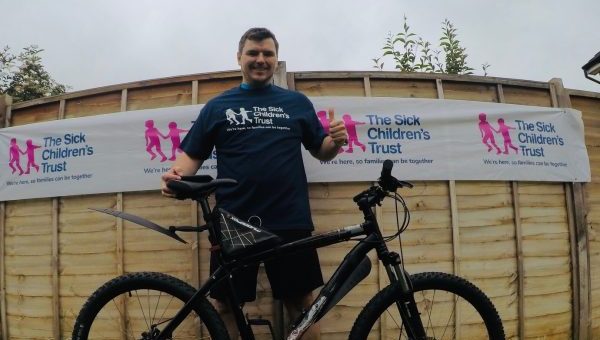Willow was born on 28 December 2016 at 27 weeks and one day gestation. This was my second pregnancy and it had been completely normal and low risk. However my waters broke unexpectedly at home and two hours later at 7pm, Willow was born. She weighed just 1.195kg (2lb 10oz).
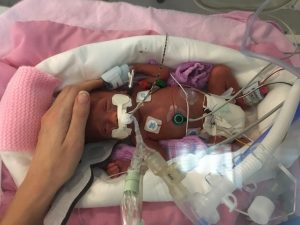
As soon as she was born, Willow was put inside a plastic bag (to help keep her warm) and taken away immediately to the Special Care Baby Unit (SCBU). She was unable to breathe on her own so was intubated and put in an incubator. The doctors at Broomfield Hospital soon identified that she needed a higher level of care than they could offer and she needed to be moved to a hospital with a Neonatal Intensive Care Unit (NICU). Willow could have been moved anywhere in the country, but a place was fortunately available at The Rosie Hospital in Cambridge, which is around 60 miles from our home.
At a few hours old, Willow was transferred by the Acute Neonatal Transfer Service (ANTS) for the hour and a half long journey. I was unable to travel with her, as I was taken into surgery following her birth. My husband, Chris, was at home with our three year old son, Finley, so was also unable to travel with her – our baby made that first journey alone.
“Because of The Sick Children’s Trust I could spend my time by my baby’s incubator, bond with her and be involved in aspects of her care such as changing her nappy and cleaning her.”
Chris and I travelled to The Rosie later that day to visit her once I had been discharged. She was tiny and barely resembled a baby with all the wires and masks covering her face. Even the tiniest of nappies covered up most of her torso. We were told by the doctors that Willow would need to stay in hospital, most likely until her due date, still three whole months away. The Rosie Hospital wasn’t just 60 miles away from our home – it was also 60 miles away from our son. We just couldn’t fathom how we were possibly going to manage. Fortunately, it was at this point that we heard about The Sick Children’s Trust. A charity that might be able to provide us with free accommodation, just minutes from Willow’s hospital bedside.
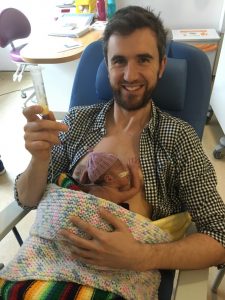
The Sick Children’s Trust’s ‘Home from Home’ Chestnut House supports families with seriously ill babies on NICU. It has eight family bedrooms and we were very fortunate to get a room. I felt such a huge sense of relief when I knew I could stay close to Willow. Because of The Sick Children’s Trust I could spend my time by my baby’s incubator, bond with her and be involved in aspects of her care such as changing her nappy and cleaning her. I could also be present for ward rounds, speak to doctors and ask questions about her care. There was also a phone in each bedroom which connected directly to the NICU; when I got up in the night to express milk, I would phone NICU to check how Willow was doing.
At two days old, the doctors attempted to take out Willow’s breathing tube. This did not go well and after a couple of minutes, Willow’s lungs haemorrhaged and began to collapse. The doctors struggled to intubate her again but persevered and were able to. Due to the damage to her lungs, she needed a higher level of breathing support; she was placed on an oscillator which vibrated her whole body to try and keep her lungs inflated.
Over the next few days, Willow had minimal handling to allow her to rest, recover and get stronger. We talked to Willow so she could hear our voices, although sometimes it was difficult to know what to say. But when Chris visited, he would read Harry Potter to her through the incubator window which was his way of letting her hear his voice.
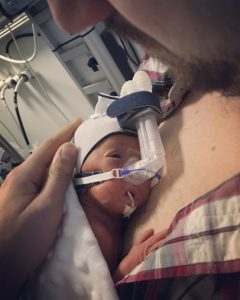
At birth, Willow was found to have a bleed on the brain which isn’t uncommon for premature babies (and even full term babies). The bleeds are graded from one to four (with four being the most severe). Willow’s was graded at levels 2 and 3. This would be monitored over the coming days and weeks to establish whether the bleed was worsening or resolving. She was found to have a patent ductus arteriosus (PDA), which meant that blood was flowing abnormally between the arteries to the heart, which is again common in premature babies because everything is underdeveloped and she was given medication to try and treat this.
At nine days old, Willow was extubated successfully. She was moved onto a different type of breathing support, called a BiPap, which was a mask on her face which blows air into her lungs constantly. This is less invasive than intubation but meant a mask was strapped very tightly to her face (to create a seal around her nose) and caused a lot of bruising and discomfort for her. But as Willow was no longer intubated she was now able to be fed some breast milk which was amazing.
Since her birth, I had been expressing milk every three hours (day and night) from my room in Chestnut House to stimulate the supply. A very laborious task but one that I found important and perhaps gave me a sense of purpose at a time when I felt utterly helpless. Staying at Chestnut House allowed me to do this and meant I had access to their hospital pumps and lactation consultant – another valuable resource.
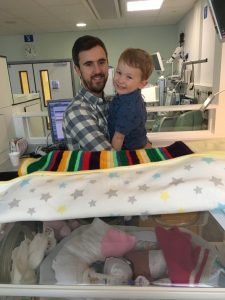
At ten days old, I was able to hold Willow for the first time. A precious and terrifying moment. She remained attached to the BiPap ventilation (which sounded like a hoover!) and many wires. It was a small military operation to get her from the incubator to my chest without getting tangled up or hurting her. Each time I held her, she had to be constantly monitored to ensure her temperature or her oxygen levels didn’t drop too much which would cause the machines to beep constantly – not a relaxing experience but lovely nonetheless. She was also unable to be out of her incubator for long as she remained under the ultraviolet light for jaundice and couldn’t be away from this for too long.As the days went by, we waited for Willow to grow stronger.
“It was a rollercoaster journey often feeling like one step forward and two steps back. Some days I was able to hold her, some days she wasn’t strong enough and I would return to Chestnut House in tears, only for the amazing staff there to comfort me and listen to my woes.”
Being able to stay at Chestnut House meant that an unbearable situation was made more bearable. It was a safe haven in a time of huge stress. It allowed us to be close to our daughter but also have somewhere to retreat to for some quiet time together as a family, or alone. It also meant that close friends and family could visit, making a very lonely time slightly less so. When Willow was born, we just couldn’t fathom how we were going to manage, especially with Finley at home. I felt like I needed to split myself in two and the guilt was overwhelming. But being at Chestnut House made this impossible situation easier to manage.
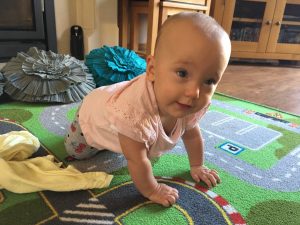
Another important aspect of staying at Chestnut House was being around other families who were going through similar situations. This meant that we were able to share our days with each other, the good and the bad. We have stayed in touch with some of the other families we met there having bonded through our shared experience.
At three weeks old, the decision was made to transfer Willow back to our local hospital. Here she would be placed on the High Dependency Unit (HDU). This was a good step for Willow, but scary for us as it meant starting again at a new hospital with doctors and nurses who didn’t know our daughter. This also meant that I would have to leave Willow at hospital on her own as Broomfield Hospital do not have the resource for families to stay there.
“When we were first shown around Chestnut House by Abi, the House Manager, I remember sobbing because I was so overwhelmed by the kindness and generosity of the charity. We felt truly awful because we had no idea that such a place existed; until we were thrown into a world which we knew nothing about it.”
The work that The Sick Children’s Trust does is so amazing and genuinely makes such a difference in a time when your world has been turned upside down. I honestly don’t know how we would have managed without them and I expect that our story would have been so different. Despite everything, we were able to bond with our precious daughter and make sense of what our family was going through; being at Chestnut House allowed us to do this. We want to raise awareness of this amazing charity so that they can continue their good work. It would be so amazing for every NICU to have a Chestnut House.
Willow stayed at Broomfield Hospital for a further five and a half weeks. As the weeks went by, she moved from HDU to SCBU. Her level of breathing support gradually reduced and at six weeks old, she came off oxygen altogether. She also had her first bath at six weeks old, something that my husband, Chris, got to do which was a special moment. We gradually said goodbye to the wires, one by one, celebrating each small triumph. At six weeks old (and still only 33 weeks gestation), Willow surprised us all by being able to breastfeed and at eight weeks and three days, our miracle baby finally came home. Since then she has received constant monitoring and ongoing care, but has done so well and shown us all what a true fighter she is.
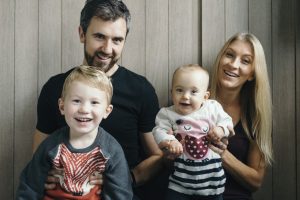
Now at four years old Willow has been doing brilliantly. Her development has been on track and she has been hitting all her milestones including recently going to school. She hasn’t needed any further treatment or hospital stays and despite being small in size, she is big in character! She is loud, sassy and hates being called “little”. She will loudly tell anyone who dares say it that she is not little, she is a big girl! She is tenacious and strong willed – the same characteristics that probably helped her to survive those early weeks. She will proudly put on her Wonder Woman costume and often refers to herself as “Wonder Willow” – which we think sums her up perfectly!
Laura Penfold, Willow’s mum


